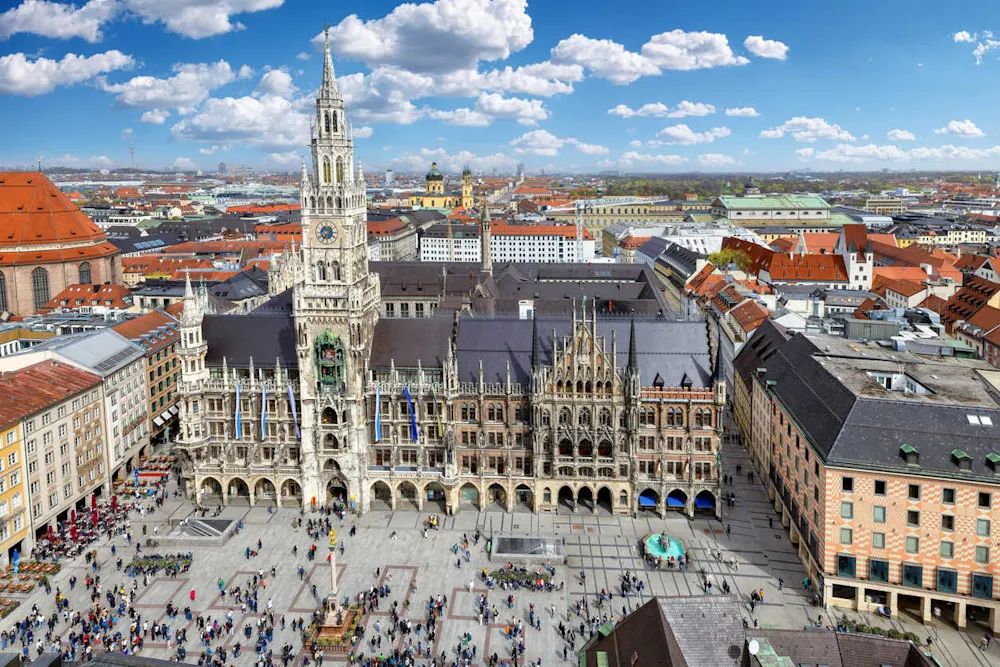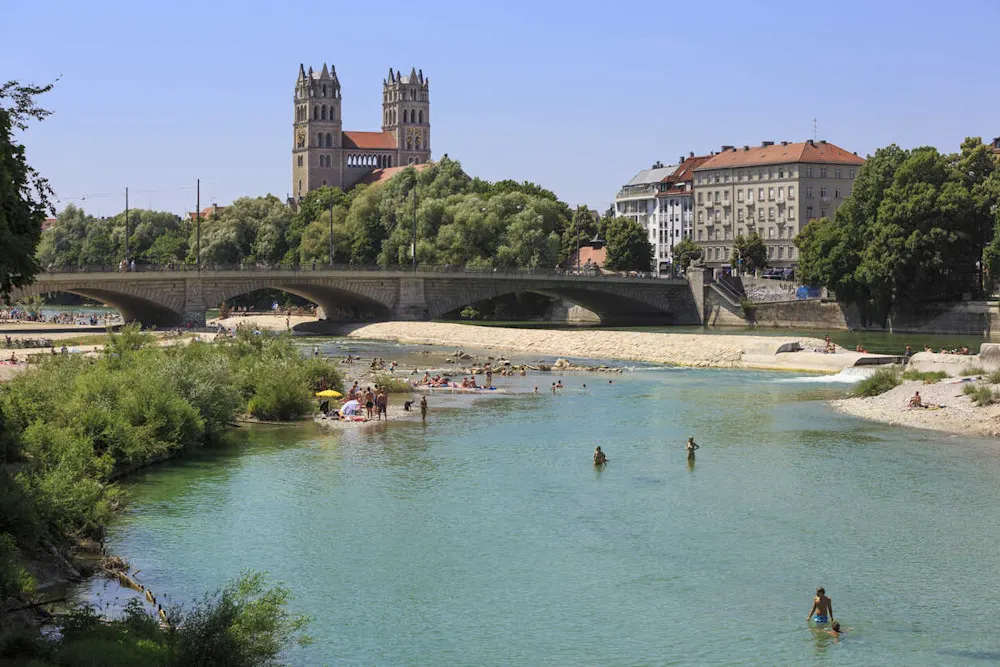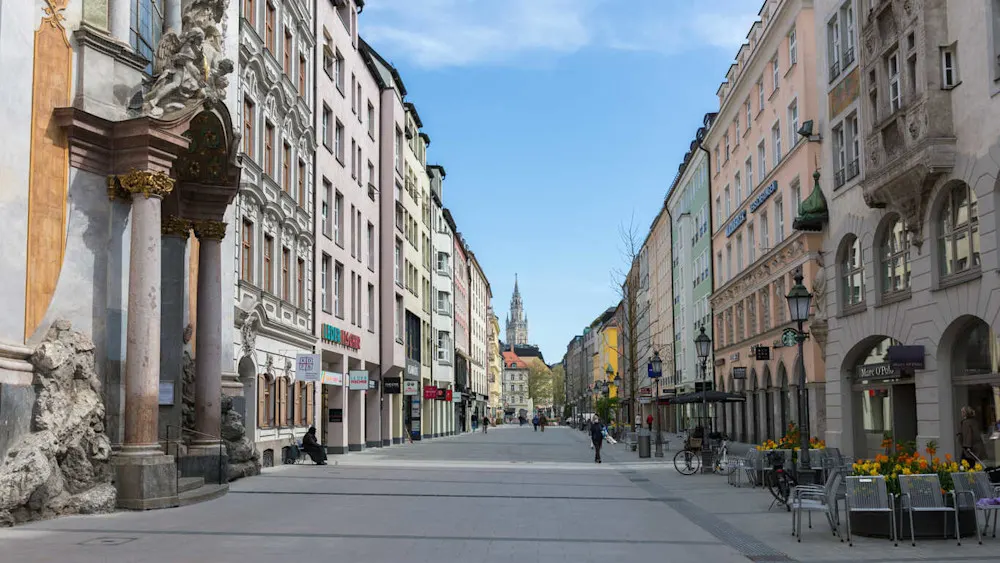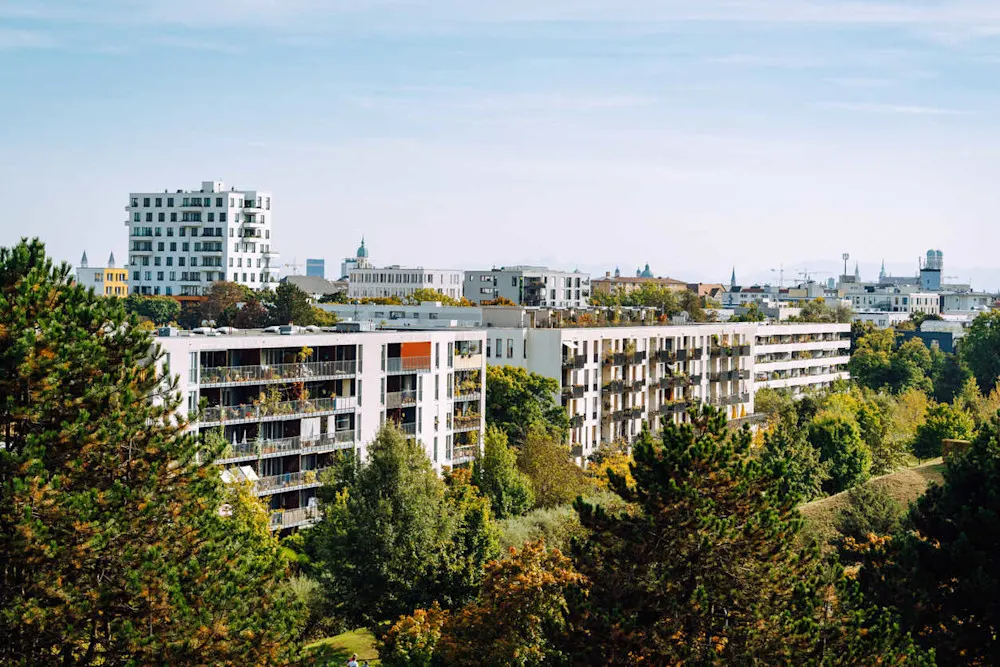If you’re looking for a postcard-perfect historical city where you can grow your career, bike to work, and enjoy breathtaking nature only an hour outside the city on the weekends, Munich is the perfect place to call home. It will steal your heart… and yet, sometimes, your patience. Munich will win you over with its beauty, safety, and riverside charm—but make no mistake, this love affair comes with a serious investment of time, energy, and a not-so-small pile of euros.
Munich’s appeal is its higher wages, great healthcare, a strong economy, and low 4% unemployment. In fact, Mercer voted it among the Top 10 Cities for Quality of Life (2023), and it’s easy to see why locals are so proud of it. Plus, there’s an international, relatively younger population (averaging 30–39 years old) who you can meet in your free time while working on your hobbies. Painting class with wine? Salsa class? Japanese? Public speaking training with Toastmasters? Hiking adventures on Saturday? If you love activities, it’s nearly impossible to be bored here.
However, if you’re looking for year-round sunshine, low taxes, and cheap apartments, Munich might not fit the bill. In fact, I’d be lying if I didn’t tell you that many people (including Germans) struggle to set up a life here. No place is perfect, and you should always have enough information to make the best decisions.
So for those thinking of moving here, here’s an overview of Munich: the good, the bad, and the ugly…
The World’s Best Retirement Havens for 2026
The World’s Best Retirement Havens for 2026
24 Countries Compared, Contrasted, Ranked, and Rated. You don’t have to be rich to enjoy a pampered retirement, you just need to know where to go. With our 35th Annual Global Retirement Index, our experts hand you a detailed roadmap. Details—and a Special Offer—Here

By submitting your email address, you will receive a free subscription to IL Postcards, The Untourist Daily and special offers from International Living and our affiliates. You can unsubscribe at any time, and we encourage you to read more about our Privacy Policy.
My Rocky Landing in Munich

I moved to Munich in 2012 with my German ex, in my mid-30s, after years of living in China. Though I’d visited back in 1996, my only memory was of Marienplatz’s neo-Gothic Rathaus—a grand building that looks like a centuries-old cathedral, framed by red-tiled rooftops and upscale cafés.
Originally, we planned to move to Berlin. But my ex landed a job in Munich, I found a great master’s program here, and the rest is history.
At that point, I had already lived in six countries outside the U.S. for work, study, and long-term travel. I figured: How hard can Munich be? It’s Western. It’s organized. Germans speak excellent English. This would be a breeze compared to Beijing.
I couldn’t have been more wrong.
Munich was tough to crack. It took us months to find an apartment. I spent countless hours at the visa office, sometimes leaving in tears without even getting an appointment. It was frustrating and humbling. Thankfully, I had two German friends, former colleagues from China, who helped me navigate the bumps along the way.
I’m deeply grateful to live here now. But I won’t sugarcoat it: the transition wasn’t easy. Still, as cliché as it sounds, it’s been absolutely worth it.
The Good: Why People Fall in Love with Munich

Outdoor Lifestyle & Natural Beauty
If you arrive in spring or summer, it’s easy to fall in love with Munich’s architecture, the greenery of the Isar River trails, and the sprawling English Garden. There are stunning old neighborhoods where you can bike everywhere, enjoy picnicking, hang out in the beer gardens, or take the train 1–2 hours away for pristine Bavarian scenery in Garmisch, Mittenwald, or Füssen. If you love winter sports, you can snowboard or ski on the weekends at a fraction of the cost of pricey Swiss or French resorts.
Socially, Bavarians are happy to share their local traditions, and it’s easy to feel included here, in a beer garden or at the hütte on top of a mountain. Aside from local culture, Munich has large groups of Turks, Croatians, Serbians, Greeks, Austrians, and Italians, and this is reflected in the many restaurant choices here. Plus, you can even get authentic Chinese, Indian, Afghan, Georgian, and Ethiopian dishes.
You’ll also notice something else right away: this is a city that moves. Despite a love for beer, pretzels, and cake, Munich residents are active. People jog, bike, swim, and even surf in the English Garden. In fact, 76.6% of German adults meet the WHO’s daily physical activity guidelines, compared to just 24.2% of Americans (I was one of them). Living here truly inspired me to prioritize my health and embrace a more active lifestyle.
Location, Location, Location
Since moving to Bavaria, I’ve mastered the art of the long weekend. Munich is brilliantly connected, whether you take a high-speed train, a Flixbus, or a BlaBlaCar ride-share.
Northern Italy is only three hours away. Vienna? Four. Prague and Ljubljana? Just five. You can travel easily, even without a car. And while trains are a romantic way to see Europe (and often cheaper within Germany), they’re sometimes more expensive than flying for international trips, so I’ve learned to compare.
Flixbus is a mixed bag, but it’s clean, cheap, has free Wi-Fi, and gets you where you need to go, as long as you’re prepared for occasional delays. For trips under five hours, it’s a great, affordable option.
Safe, Clean, and Eco-Friendly

As an American woman, safety is a big deal for me. Munich consistently ranks among the world’s safest cities (Global Residence Index lists it at #19), and it’s common to see women walking alone at night. Subways and trams run all night on weekends, and Uber rides across the city rarely top €20–30.
Cleanliness is another standout. As far as public spaces, I’m really impressed by how people clean up after themselves after picnics and BBQs, where they even bring their own beer pong tables, huge speakers, tents, and throw a crate of beer into the icy Isar River to stay cold. And yet, even after making the biggest messes, they leave the place spotless, making sure to throw away trash, recycle, and line up beer bottles for Pfand (bottle deposit) collection. If sustainability and eco-friendliness are important to you, you will fit right in here.
Great for Professionals
Munich’s strong economy, high wages, and low unemployment make it a great place for both seasoned professionals and early-career expats.
Global companies like Siemens, Allianz, BMW, and Microsoft have headquarters or major offices here. The city also boasts a thriving startup scene and world-class universities like TUM (Technische Universität München).
If you work in STEM (Science, Technology, Engineering, Mathematics) jobs, you don’t need to be fluent in German, but for everyone else, unfortunately, not having at least a B1/B2 language level can really shrink your chances at being competitive. But for most other industries, you’ll need solid German to compete.
In Germany, once you make it past the probationary period in most companies (usually six months), you’re assured an unlimited contract and at least a three-month notice period, and salary should either party choose to end it. If you have a full-time contract, health insurance, and taxes are taken directly out of your paycheck each month. Depending on your salary, you can choose public insurance like TK or AOK, or private providers like Ottonova. Unless you have a chronic condition, public insurance is usually sufficient for annual checkups, routine procedures, dental care, and emergencies.
Munich has a strong reputation for healthcare thanks to LMU University Hospital and top-tier public and private hospitals such as Klinikum Rechts der Isar, which even attracts well-to-do medical travel patients. I love that I can book appointments online using apps like Doctolib and Doctena for nearly anything, and that it’s quick and easy. It still blows my mind, as an American, that I just show up with my TK card and leave without a bill.
The World’s Best Retirement Havens for 2026
The World’s Best Retirement Havens for 2026
24 Countries Compared, Contrasted, Ranked, and Rated. You don’t have to be rich to enjoy a pampered retirement, you just need to know where to go. With our 35th Annual Global Retirement Index, our experts hand you a detailed roadmap. Details—and a Special Offer—Here

By submitting your email address, you will receive a free subscription to IL Postcards, The Untourist Daily and special offers from International Living and our affiliates. You can unsubscribe at any time, and we encourage you to read more about our Privacy Policy.
The Bad: Where Munich Might Not Be a Good Fit

Not for Late-Night Party People
Munich is often called a großes Dorf, a “big town,” and for good reason. Despite its size and global economy, the city remains steeped in tradition. Shops close on Sundays, and buildings in the Old Town can’t be taller than the Frauenkirche (100 meters). Nightlife leans more toward cozy beer gardens than underground clubs.
There’s still a vibrant social scene, plenty of bars, live music, and festivals like Oktoberfest and Tollwood, but it’s not Berlin. Nights out are pricey, and the vibe is more reserved. If you’re craving edgy clubs, cheap global eats, and nonstop buzz, you might feel limited in choice.
Not for a Spontaneous Move
The honest truth is that moving to Munich takes time, energy, financial commitment, and lots of determination and patience, no matter how you cut it. And you really do have to decide to appreciate the good things, or you’ll make yourself miserable, because some things in Germany are simply way more complicated than they need to be. Job hunting and the interview process can easily take several months. Visas take time, and apartment hunting is a real headache (more on that in the “Ugly” section).
I’ve seen quite a few Instagram and TikTok channels claiming that Munich’s big international companies like Allianz or Siemens are great for native English speakers, as if it’s super easy to get hired and we’re in demand. The truth is, educated Germans speak English fluently, and 30% of them hold master’s degrees, making them extremely competitive. You’ll need to differentiate yourself with experience, because just speaking English won’t give you much of an edge.
As for speaking German, of course, it’s possible to live in Munich without knowing the language, but I can tell you from personal experience, it’s frustrating. I felt like a helpless toddler, unable to communicate at the bakery, in a taxi, at the supermarket, or at the post office. To avoid this, I recommend taking a German class online before you arrive. Unfortunately, German bureaucracy can be confusing, and most contractual issues—real estate, insurance claims, visa applications, even setting up internet—are typically handled over the phone in German.
Visas Can Be Tricky
Visa rules depend on your nationality and purpose. EU citizens have it easiest, especially if they speak German and have savings. Many work in sectors like hospitality, construction, or transport.
For non-EU residents, it’s more complicated. Sponsored work visas are common, and the new Opportunity Card allows skilled professionals to live in Germany for a year while job-hunting.
Freelancer visas are also an option if you can show income and health coverage. Student visas remain one of the simplest entry points, offering a path to work, residency, and even citizenship over time.
High Cost of Living
Munich regularly ranks among Germany’s most expensive cities. The average monthly budget for a single person is around €2,500 after taxes.
Here’s what you might expect to pay:
Shared room: €500–€900/month
Studio: €900–€1,300/month
One-bedroom flat: €1,200–€2,000/month
Dinner out: €20–€30
Beer: €5–€6
Cocktail: €10–€15
It’s possible to live modestly, especially with roommates, but Munich is far from a budget destination.
Winter Weather
Munich gets an estimated 1,709 hours of sunlight per year, compared to Malaga’s 2,900, so many people—including Germans—find winter difficult unless they’re into winter sports. However, if you’re from a hot, sunny country, you might actually enjoy the change. I have friends from India and the Middle East who absolutely love it, and others from Colombia and Spain who really struggle with the rain and cloudiness.
Still, there are plenty of affordable flights to places like Spain, Portugal, or the South of France. And with 20–30 days of paid vacation each year, it’s easy to escape to a sun-soaked destination with Mediterranean food.
The Ugly: Let’s Talk Housing

Finding a Flat = A Modern-Day Quest
Let’s not sugarcoat it: finding an apartment in Munich can be a stressful, expensive, and time-consuming ordeal. In fact, housing is so competitive here that people hang on to their flats for dear life, often staying put even through breakups or job changes just to avoid the nightmare of starting over.
Worse still, newcomers are vulnerable to scams. A common one? Someone claims to be abroad and asks you to wire money via Western Union for a deposit. In return, they promise to FedEx you the key. It’s a scam. No matter how legit it looks—if you don’t sign a contract, transfer the funds, and receive the keys in hand, you don’t have an apartment.
Housing pressure creates unusual living situations. When I was flat-hunting, I saw one man renting his living room for €550, while a student rented the bedroom, and he slept on a mattress in the kitchen. Another guy rented out his bedroom and slept on a sofa on the balcony, for €600 a month.
If you’re moving to Munich, be prepared to spend a few months in temporary housing, hotels, or Airbnb, and bring enough savings to cover that time. One good short-term option is Mr. Lodge, which offers furnished apartments (starting around €1,250/month) that include Wi-Fi, linens, a washing machine, and basic kitchen gear.
Another major hurdle is credit history. Without a German credit record (called SCHUFA), some landlords require extra deposit payments, three to six months’ rent, or pay slips showing a solid income. In some cases, your employer may need to co-sign.
The best way to secure a flat? Word of mouth. If you know someone already living in Munich, especially a co-worker, they might be able to help you find a place faster than any online platform.
Is Munich Right for You?
Munich is a fantastic city with so much to offer, but it’s not always an easy landing. For me, now in my mid-40s and still active, it’s the perfect fit. I feel lucky to call this place home. But everyone’s experience is different.
Some people adore Munich’s order, beauty, and stability. Others find it too reserved or too expensive. Just like New York or Paris, it inspires strong opinions; you either click with it or you don’t.
So ask yourself: What matters most to you in a place to live? Stability? Safety? Culture? Language? Weather? Healthcare? Cost of living? Earning potential?
If Munich ticks your boxes, I’d recommend giving it a real shot and committing to at least a few years. It’s not effortless. But maybe that’s why, when it finally does feel like home, it feels incredibly rewarding.
The World’s Best Retirement Havens for 2026
The World’s Best Retirement Havens for 2026
24 Countries Compared, Contrasted, Ranked, and Rated. You don’t have to be rich to enjoy a pampered retirement, you just need to know where to go. With our 35th Annual Global Retirement Index, our experts hand you a detailed roadmap. Details—and a Special Offer—Here

By submitting your email address, you will receive a free subscription to IL Postcards, The Untourist Daily and special offers from International Living and our affiliates. You can unsubscribe at any time, and we encourage you to read more about our Privacy Policy.
